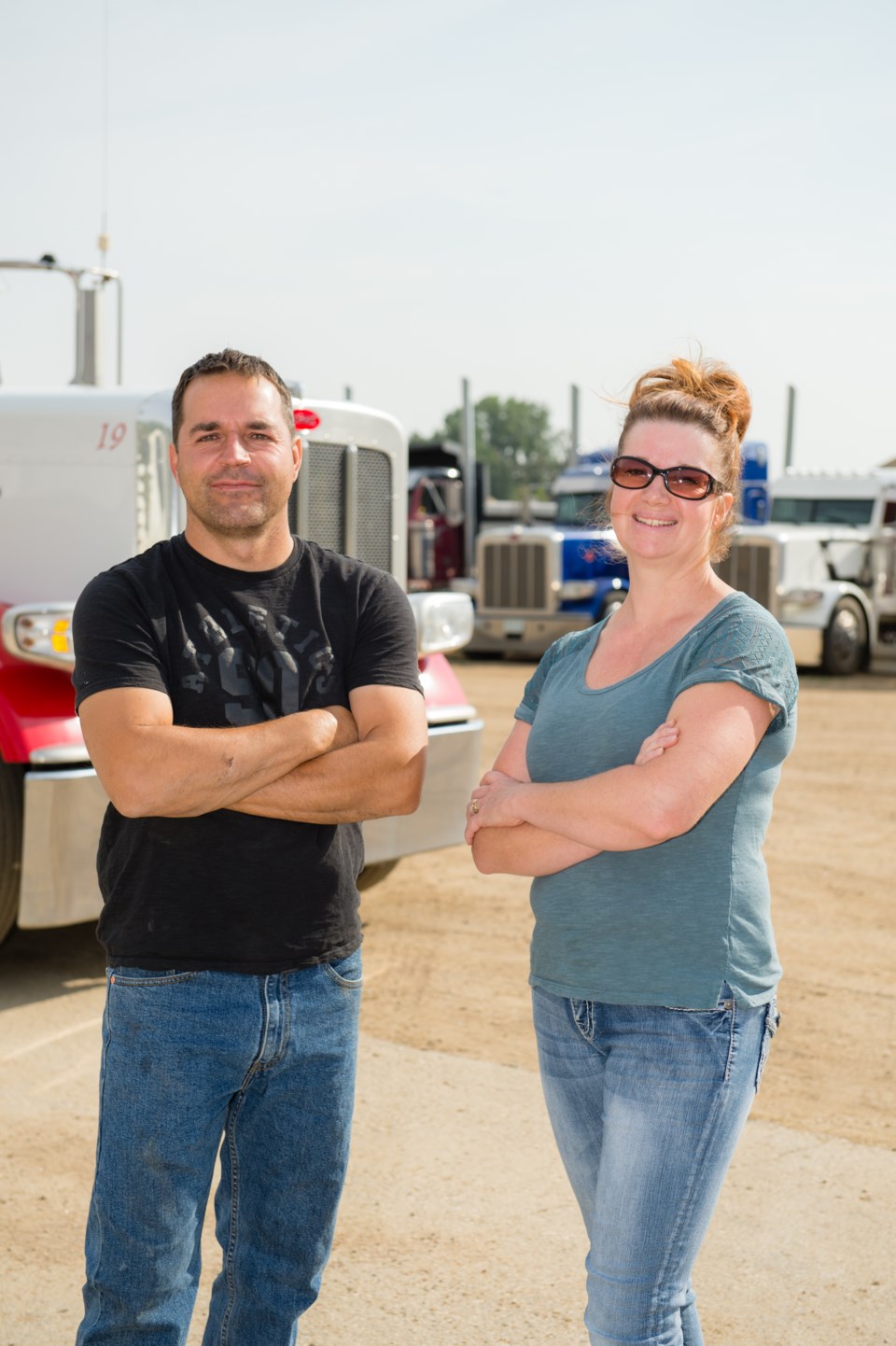Radville ŌĆō┬Ā When Pipeline News last profiled Pratt Transport Ltd. of Radville in our April, 2010 edition, the story focused on their unique business strategy of building ŌĆ£gliderŌĆØ trucks using, older, pre-tiered emissions controls engines. That strategy has paid off in the intervening years, and theyŌĆÖve built a total of ten such gliders, the core of their fleet.
Asked about the gliders, Rob Pratt said, ŌĆ£The only reason IŌĆÖm still in business is because I had those trucks.ŌĆØ
Rob owns and operates the business with his wife Christine. They spoke to Pipeline Newsin the recent addition to their shop in Radville on Aug. 17.
The term ŌĆśgliderŌĆÖ is a reference to an aircraft without an engine. In this case, itŌĆÖs a truck without a drive train.
ŌĆ£It shows up at the dealership without any power train,ŌĆØ he explained in our original 2010 story. All their gliders have been Peterbilts, and the engines are pre-1999.
ŌĆ£No tier,ŌĆØ is how he described them.
Surprisingly, the supply of engines has not run out, 18 years after the cutoff, but glider packages are harder to get now, he said.
Because theyŌĆÖve lasted so well, the most recent glider he built in 2015.
ŌĆ£The price of trucks has gone up so much, and the trucks I built are so reliable, I donŌĆÖt need any new trucks. Those trucks have 2.4 million kilometres, 40,000 hours without any no engine repairs. Half of my other trucks have 1.6 million on them, and they run every day.
ŌĆ£I work with guys who went broke because they had brand new trucks in the shop all the time. In 2009, 2011, 2012, people were struggling.ŌĆØ
Pratt Transport specializes in fluid and natural gas liquids (NGLs) hauling as well as construction.
ŌĆ£ThereŌĆÖs more construction right now, because itŌĆÖs slow in the fluid-hauling industry,ŌĆØ he said.
TheyŌĆÖre running three to four power units on a good day. August slowed down, but they expect things to get busier in the winter, when they would run six or seven.
The products include more NGLS now than fluids. Noting the seasonal work, Rob said thatŌĆÖs why theyŌĆÖre doing more construction in the summer.
This includes scrapers, grader, loader, gravel, topsoil for oil site reclamation. They do aluminum welding and have a gravel pit, too. ┬Ā┬Ā
This summer they completed a sewage lagoon for the town of Radville. ŌĆ£It was four hectares, 150,000 cubic yards of dirt,ŌĆØ he said. It took all summer.
Christine said they have around 10 and 12 people, between ownership, drivers and construction. Their peak was this past spring, at 15.
Rob noted they work together with their buddies who have other businesses. ŌĆ£We kind of share guys,ŌĆØ he said.
Rob said, ŌĆ£WeŌĆÖve diversified a lot, doing water and sewer, building this lagoon, farming.
ŌĆ£Otherwise, we would be about half the size we were, because at one time we had probably 12 drivers, but now weŌĆÖre struggling to keep seven busy,ŌĆØ Christine said.
Thus, their construction work has made up for the shortfall in oilfield work. ┬Ā
Their NGL hauls can go from Saskatchewan to Ontario, Montana, ąĪ└Č╩ėŲĄ Dakota, North Dakota or Minnesota. ŌĆ£There are still some in-field NGLs, raw gas to a gas plant for processing, or caverns.ŌĆØ
The trips can be from 20 minutes to 10 hours.
Weather, crops that need drying, are just some of the factors affecting their hauls.
The glider idea shows RobŌĆÖs contrarian streak. When they do dugouts for farmers, for instance, theyŌĆÖll use scrapers instead of excavators. ŌĆ£Basically, what everyone else is doing, I try to do the opposite,ŌĆØ Rob said as Christine laughed. ŌĆ£If you can find more efficient ways to make moneyŌĆ”
ŌĆ£Everyone uses rock trucks and hoes to move dirt. I use scrapers. ItŌĆÖs more efficient.ŌĆØ
Three years into this oil downturn, theyŌĆÖve survived. Rob said, ŌĆ£ItŌĆÖs been good, ąĪ└Č╩ėŲĄ diverse.ŌĆØ
Christine said to Rob, ŌĆ£I used to think you were crazy, trying new things.ŌĆØ
The Pratts have four children, ages 10, 12, 15 and 17, and theyŌĆÖre starting to help out with the business when theyŌĆÖre not active in their various activities. The youngest clean the shop, and the oldest will run equipment.┬Ā




